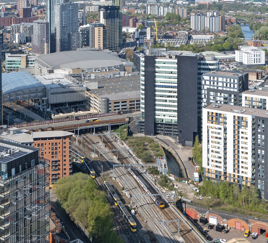FEWER CARS
“This is quite extraordinary,” concludes the Less is More study.
“No one would have imagined that the economy would be able to bounce back in the way it has with almost 10% less weekday travel than before. This is an important signal and an opportunity to change the way we plan to meet the needs of society.”
The Department for Transport estimates that during 2021, car traffic levels in England and Wales were at 85% of previous levels. This represents a reduction of 73.2 billion vehicle kilometres and overturns the popular perception that road traffic has returned to normal, and that congestion is as bad as ever.
Data from TomTom suggests that in September and October 2021, congestion levels were down 6% on 2019 levels in the morning and evening peaks, with no change during the day. This benefits all road users, whether they have the opportunity to work from home or not.
“If we had seen more than 10% reduction in car driving before the pandemic, it would have been big news,” comments Professor Anable.
“We have to think about the shift to working from home - not just in terms of the journey-to-work reduction, but what it means for the way people can live their everyday lives more locally.”
In the last quarter of 2021, online had jumped to 28% of all retail sales (6.7% higher than it would have been without the pandemic). In particular, online food sales have doubled compared with 2019, bringing a reduction in the frequency with which shops are visited.
“We have decoupled private car use from GDP,” says Professor Docherty.
“Arguably, there is a substitution of car traffic for light vans, because more people have swapped going to the supermarket for having someone else deliver from that supermarket.”
Professor Anable adds: “When we try to quantify the energy and carbon impact of working from home, we focus on the commute and the energy consumed in the home office. We tend to forget all the adaptations around where people shop, where the nursery is, or where people go to the gym. These are the bulk of travel, not work.”
In fact, car travel per person has been falling slightly for 20 years. It has declined most among the wealthiest part of the population - the people who can most easily work from home. Where traffic has grown, it is related to the overall increase in population, not the distance travelled per person.
The study finds that the turn away from public transport during the pandemic has not resulted in a shift to the private car instead. “The unequivocal answer to that is no,” it reports.
“There has been a lot of doom and gloom in the rail industry about people deserting the trains to go by road instead,” the authors find.
“This report does not support that at all. It is the first study with good numbers in it, that really do inform us about what people are choosing. There is no evidence of a switch from rail to road.”
Instead, 14% of households that had two cars before the pandemic now have just one. Overall, car ownership has fallen by 1.7%. “This is important for future policies connected to climate change,” claim the authors.
Professor Anable: “Our hypothesis is that this change is related to working from home. But we have not yet found that to be a strong relationship, so we will do further work. There will be income and cost factors.
“Many debates about car use and switching to public transport focus on the extremes: giving up the car altogether. I’ve been trying to cut through that - it’s about reducing the number of cars, not giving them up. This change from two cars to one in a household is something we can really seize as an opportunity to alter the flavour of the debate.”
Anthony Smith agrees: “Owning a car will become less common,” he says.
“But people will use cars rather than own them. Once you’ve bought a car, and sunk your money in it, you are going to use it. Subscription models for car financing are very interesting.
“Electric cars are getting cheaper, better, easier to finance. They are a pretty compelling product, and people who have them lose any compelling guilt about tailpipe emissions. Outside London, the car will remain dominant.
“We have had a hundred years of baking cars into everything we do. It is going to take decades for us to think in a different way about patterns of land use.”
LONGER-TERM ISSUES
The Less is More study concludes that elements of our transport system have changed more profoundly and more rapidly than at any point in the modern era.
“Although the financial sustainability of public transport is of obvious concern, we have, albeit by accident, achieved a larger decoupling of car use from GDP than would have been thought possible,” it finds.
“While journey times will continue to matter, there are now different choices about whether travel is necessary at all for parts of the economy.
“How will we use those lessons to tackle the grand challenges we face in terms of decarbonisation and social inequality, in ways which pre-pandemic policy actions did not?”














